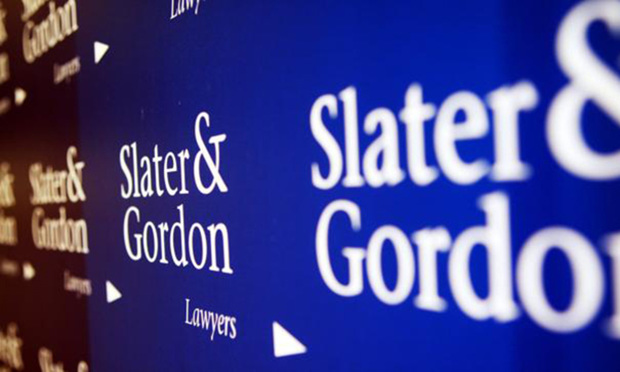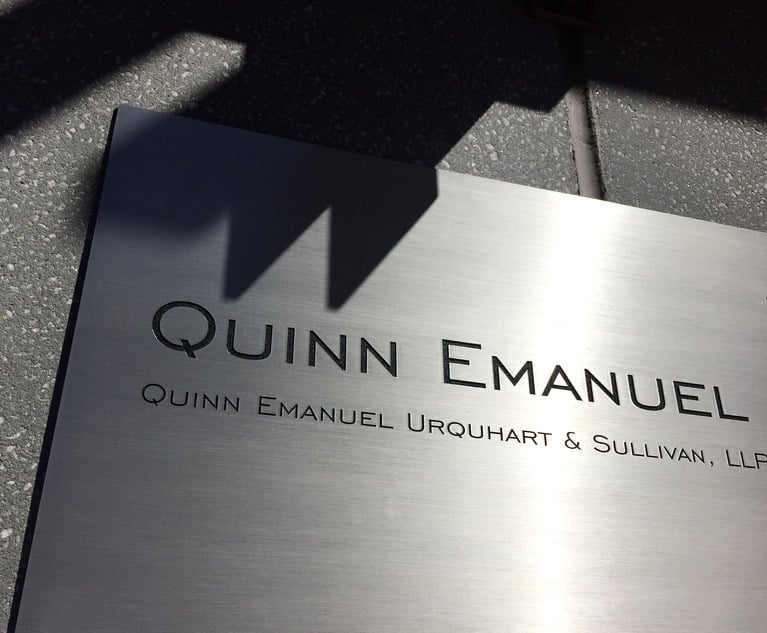Slater & Gordon Working From Home: How Will it Work?
Former lawyers raise concerns about the UK plan, but the firm insists: "We won't expect our people to hop on a busy Central Line for work."
May 29, 2020 at 08:38 AM
4 minute read
 Slater and Gordon is preparing its London staff to work remotely for the "majority of the time".
Slater and Gordon is preparing its London staff to work remotely for the "majority of the time".
When news broke that Slater & Gordon would not renew its lease on its London office and would instead set up all its London staff to work remotely, some were skeptical.
The Anglo-Australian firm announced on Wednesday that once the lease for its Holborn office expires in September, it will be looking to move to a more flexible office and will encourage its workforce to work from home "for the majority of the time".
But one former lawyer said: "I just wonder if something is lost when you don't have an opportunity for people to have a collegiate working environment. Law can be a bit lonely. It's just something quite different when you're only based at home.
"There's a lot of networking involved in law: a lot of lunches, breakfasts and going to events. Does that go by the wayside? And are [junior lawyers] really going to get the training from wherever they live?"
The firm will operate with a smaller London office premises that will be used primarily for meetings, although it is unclear whether this will be in place by the time the September lease comes to an end.
On Friday, the firm's chief people officer, Alicia Alinia, responded to the comments, saying: "We are moving towards a flexible culture. During this lockdown period, we took into account the demographics of our staff, what they needed and what we could provide to them. If they needed more screens, desks, chairs, etc., we delivered it to them. Working from home made us realise: 'Actually, I don't need to be seen at work for my manager to know that I'm working.'
"The new office will be designed for meeting space. It won't be somewhere where you store things, and we encourage people to come in for a real purpose such as team-building and meeting their colleagues and/or clients, as opposed to expecting to see traditional 9am to 5pm employee presenteism in the office. We won't expect our people to hop on a busy Central Line for work. Everyone just learns to manage their time better, and we'll become a much more output-driven business."
Throughout the lockdown, the firm has kept skeleton staff in its digital post room to print or scan documents and send them to fee-earners, and will continue to support its lawyers that way but, according to Alinia, the firm will review its use of technology as it evolves to better support its lawyers later on.
She added that throughout the lockdown, the firm had seen their internal engagement and productivity go up. She said that the firm's Manchester and Liverpool offices "have felt more engaged than ever before" thanks to virtual bi-weekly events, and other virtual socialising events.
Alinia added: "Working from places where your talent is the most productive is the way forward. It's not about policy anymore, it's about culture. Millenials want to choose to come into an office for a real purpose. Mothers coming back from maternity leave, who would previously often be worried about asking for more flexible work schedules, don't have to worry about that anymore. Remote working is encouraging for a diverse workforce."
The firm has put in place a virtual induction process for its junior lawyers throughout the lockdown, and created a virtual learning supervisory environment. Moving forward, it will look to ensure that trainees and apprentices will still get a mix of face to face training whilst also remote-working.
Alinia said: "How much more can you get out of trainees if you have a flexible working environment and provide the work-life balance they so heavily demand?"
Read more:
Welcome to the Law Firm Office of the Future: Smaller, Higher-Tech and One-Way
The Coronavirus Will Change the Legal Industry's Approach to Remote Work—But How?
Baker McKenzie Shuts Down London Office Following Coronavirus Scare
This content has been archived. It is available through our partners, LexisNexis® and Bloomberg Law.
To view this content, please continue to their sites.
Not a Lexis Subscriber?
Subscribe Now
Not a Bloomberg Law Subscriber?
Subscribe Now
NOT FOR REPRINT
© 2025 ALM Global, LLC, All Rights Reserved. Request academic re-use from www.copyright.com. All other uses, submit a request to [email protected]. For more information visit Asset & Logo Licensing.
You Might Like
View All
X Ordered to Release Data by German Court Amid Election Interference Concerns

Compliance With the EU's AI Act Lags Behind as First Provisions Take Effect

Quinn Emanuel's Hamburg Managing Partner and Four-Lawyer Team Jump to Willkie Farr

Trump ICC Sanctions Condemned as ‘Brazen Attack’ on International Law
Law Firms Mentioned
Trending Stories
- 1ACC CLO Survey Waves Warning Flags for Boards
- 2States Accuse Trump of Thwarting Court's Funding Restoration Order
- 3Microsoft Becomes Latest Tech Company to Face Claims of Stealing Marketing Commissions From Influencers
- 4Coral Gables Attorney Busted for Stalking Lawyer
- 5Trump's DOJ Delays Releasing Jan. 6 FBI Agents List Under Consent Order
Who Got The Work
J. Brugh Lower of Gibbons has entered an appearance for industrial equipment supplier Devco Corporation in a pending trademark infringement lawsuit. The suit, accusing the defendant of selling knock-off Graco products, was filed Dec. 18 in New Jersey District Court by Rivkin Radler on behalf of Graco Inc. and Graco Minnesota. The case, assigned to U.S. District Judge Zahid N. Quraishi, is 3:24-cv-11294, Graco Inc. et al v. Devco Corporation.
Who Got The Work
Rebecca Maller-Stein and Kent A. Yalowitz of Arnold & Porter Kaye Scholer have entered their appearances for Hanaco Venture Capital and its executives, Lior Prosor and David Frankel, in a pending securities lawsuit. The action, filed on Dec. 24 in New York Southern District Court by Zell, Aron & Co. on behalf of Goldeneye Advisors, accuses the defendants of negligently and fraudulently managing the plaintiff's $1 million investment. The case, assigned to U.S. District Judge Vernon S. Broderick, is 1:24-cv-09918, Goldeneye Advisors, LLC v. Hanaco Venture Capital, Ltd. et al.
Who Got The Work
Attorneys from A&O Shearman has stepped in as defense counsel for Toronto-Dominion Bank and other defendants in a pending securities class action. The suit, filed Dec. 11 in New York Southern District Court by Bleichmar Fonti & Auld, accuses the defendants of concealing the bank's 'pervasive' deficiencies in regards to its compliance with the Bank Secrecy Act and the quality of its anti-money laundering controls. The case, assigned to U.S. District Judge Arun Subramanian, is 1:24-cv-09445, Gonzalez v. The Toronto-Dominion Bank et al.
Who Got The Work
Crown Castle International, a Pennsylvania company providing shared communications infrastructure, has turned to Luke D. Wolf of Gordon Rees Scully Mansukhani to fend off a pending breach-of-contract lawsuit. The court action, filed Nov. 25 in Michigan Eastern District Court by Hooper Hathaway PC on behalf of The Town Residences LLC, accuses Crown Castle of failing to transfer approximately $30,000 in utility payments from T-Mobile in breach of a roof-top lease and assignment agreement. The case, assigned to U.S. District Judge Susan K. Declercq, is 2:24-cv-13131, The Town Residences LLC v. T-Mobile US, Inc. et al.
Who Got The Work
Wilfred P. Coronato and Daniel M. Schwartz of McCarter & English have stepped in as defense counsel to Electrolux Home Products Inc. in a pending product liability lawsuit. The court action, filed Nov. 26 in New York Eastern District Court by Poulos Lopiccolo PC and Nagel Rice LLP on behalf of David Stern, alleges that the defendant's refrigerators’ drawers and shelving repeatedly break and fall apart within months after purchase. The case, assigned to U.S. District Judge Joan M. Azrack, is 2:24-cv-08204, Stern v. Electrolux Home Products, Inc.
Featured Firms
Law Offices of Gary Martin Hays & Associates, P.C.
(470) 294-1674
Law Offices of Mark E. Salomone
(857) 444-6468
Smith & Hassler
(713) 739-1250








